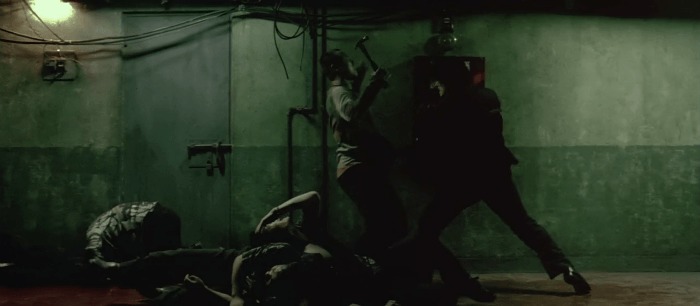Oh Dae-su, what have you done?
Oldboy is a hard film to explain. It’s a brilliant, brutal thriller that takes the viewer on a journey you cannot possibly see coming. And if you do somehow manage to see the endgame before it plays out, there’s no way you could believe you were correct until it’s all laid out in front of you.
The second of Korean director Park Chan-wook’s “Vengeance Trilogy”, Oldboy is the story of Oh Dae-su. He’s a drunk businessman, out making a general ass of himself on the night of his young daughter’s birthday. He wakes up, trapped in what looks like a cheap hotel room, with no idea of why he’s there or who his captors are. All he knows is that he is trapped, passing the time watching TV, which is how he finds out he’s been framed for his wife’s murder, shadowboxing, writing, and not dying.
And the time he passes runs from 1988 to 2003.
After 15 years of being imprisoned, he is unceremoniously released and starts down a path of vengeance that will consume him if not the entire world.
Watching Oh Dae-su, played by Choi Min-sik in truly epic fashion, follow this path of inevitable self destruction is both entertaining and disturbing. He has become a violent, driven man, focused on revenge above anything else. He doesn’t even search for his daughter upon his release, instead seeking out the who and the why of his time in captivity. And he doles out violent repercussions to those connected to it.
Loosely based on the Japanses manga of the same name, Park Chan-wook’s film takes more than a few liberties with the source material. One of the big differences is how much more violent the film is as well as divide between the two very different leading characters. Spike Lee then remade the film in 2013 starring Josh Brolin as the anguished hero. While there were aspects that remained the same, Lee’s version looses the ambiguity of the ending which is a core part of the Korean film.
Park Chan-wook intentionally created an ending that is open to interpretation, leaving the viewer to wonder how our hero has truly faired in the face of seemingly insurmountable adversity. Has his mission been a success or a failure? Or is it both? The end of the Lee/Brolin adaptation is much clearer and defined, something that North American audiences seem to appreciate more than ambiguousness. Just look at our collective responses to the end of The Sopranos. While Lee did a reasonably good job of adapting and Americanizing the film in the least offensive way possible, his version lacks the intensity and elegance of Park Chan-wook’s, in part due to the certainty of its ending.
Your mind is truly left racing at the end of the Korean version of Oldboy, searching for ways to prove the outcome wrong.
At its core, Oldboy is a story about the price of vengeance, and not just the price Oh Dae-su must pay but also his tormentor who is on longer path with a similar end. There is eloquence in its brutality, which is necessary and at times hard to watch.
And if after your done watching Choi Min-sik as Oh Dae-su you find that you just can’t process what he’s done, check him out in Park Chan-wook’s third vengeance film, Sympathy for Lady Vengeance.
He plays terrible well.
